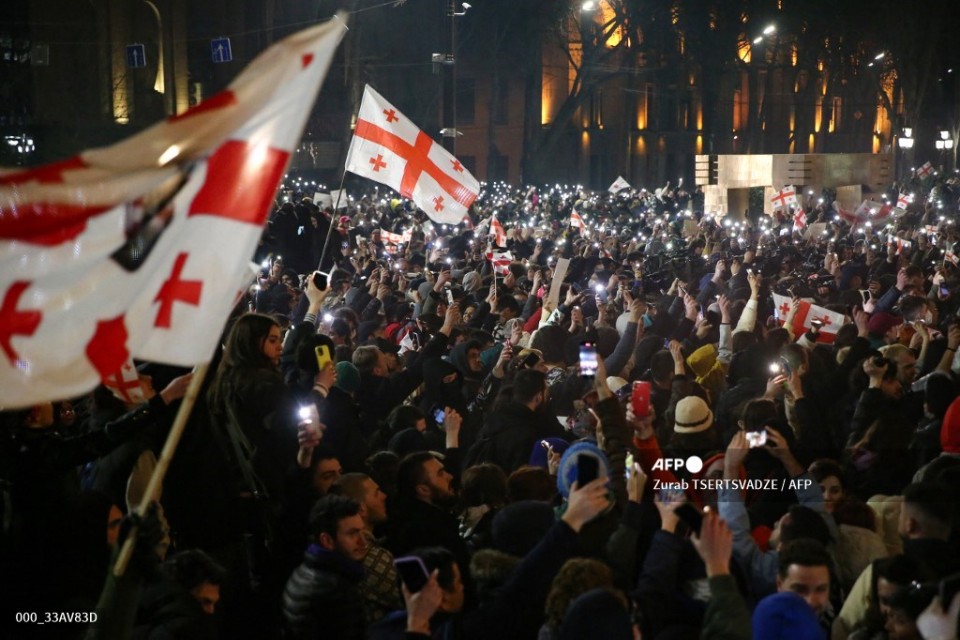
by Irakli METREVELI
At least 30,000 protesters took to the streets of Georgia for a third day running Thursday despite the ruling party’s promise to drop a controversial “foreign agent” bill reminiscent of Russian legislation used to silence critics.
Waving Georgian, Ukrainian and EU flags, protesters gathered outside the parliament building in the capital Tbilisi, piling pressure on the government, accused of flirting with the Kremlin and putting the Black Sea nation on an authoritarian path.
Georgian and Ukrainian anthems as well as “Ode to Joy”, the European Union anthem, were performed at the rally. Protesters also shouted anti-government slogans, with some demonstrators calling for it to resign.
“Our government is our sole obstacle to joining the EU, which is ready to give us (membership) candidacy,” mathematician Eka Kamkamidze, 39, told AFP.
Another protester, 30-year-old painter Mamuka Kiria, said: “Georgians are united in their will to join Europe and the government is isolated — from its people and internationally.”
Opposition politicians kept a low profile at the rally, letting students of Tbilisi universities take centre stage.
Many speakers called for early parliamentary elections, while others vowed to push the government to implement reforms needed to put Georgia on an EU membership path.
Tens of thousands took to the streets this week after lawmakers gave their initial backing to the “foreign agents” bill. On Tuesday and Wednesday, protesters clashed with police, and law enforcement fired water cannon and tear gas at the demonstrators.
On Thursday morning, the Georgian Dream ruling party backtracked under pressure, announcing it would drop the bill — but the opposition said it would stage more rallies.
Organisers called on Georgians to take to the streets at noon Friday when parliament is expected to formally withdraw the divisive bill.
– ‘First victory’ –
On Thursday evening, President Salome Zurabishvili sent a message of support to the protesters in a televised address from New York.
“I want to congratulate society on its first victory. I am proud of the people who made their voices heard,” Zurabishvili said.
“There is distrust towards the government as we pursue our European path.”
Opposition parties said in a joint statement that the protests would continue, pointing to a lack of guarantees “that Georgia is firmly on a pro-Western course”.
The interior ministry said on Thursday that all those detained at rallies earlier in the week had been freed.
– ‘European future’ –
Georgian authorities have faced mounting international criticism over a perceived backsliding on democracy, seriously damaging Tbilisi’s ties with Brussels.
The EU delegation in Georgia welcomed the government’s announcement that it was withdrawing the draft law, adding that they “encourage all political leaders in Georgia to resume pro-EU reforms”.
French President Emmanuel Macron said that pro-European Georgia “can count” on France.
“Georgians’ commitment to democratic values, freedom of the press and freedom of association has been heard,” Macron tweeted.
The United States also welcomed the Georgian government’s dropping of the bill but called for its complete withdrawal.
“We urge the ruling party to officially retract this bill and not to further this type of legislation, precisely because it’s incompatible with Georgian and Euro-Atlantic values,” said State Department spokesman Ned Price.
The Kremlin on Thursday expressed concern at the mass protests in neighbouring Georgia.
Moscow and Tbilisi went to war in 2008 and Russia still controls Georgia’s breakaway Abkhazia and South Ossetia regions, although the territories are recognised internationally as part of Georgia.
– ‘Big moment’ –
Tom de Waal, a senior fellow at Carnegie Europe, said this week that both the bill and the police crackdown on protesters represented a challenge in the politically turbulent country.
“It’s a big moment for Georgia, still a democracy, but definitely a struggling one,” he said on Twitter.
In Russia, the Kremlin has used the “foreign agent” label against opponents, journalists and human rights activists accused of leading foreign-funded political activities.
Since Russia invaded Ukraine, Georgia has hosted an influx of anti-war Russians. But in recent weeks authorities have barred some Kremlin critics from entering the country, and observers have warned of a drift towards Moscow.
Georgia’s treatment of jailed ex-president Mikheil Saakashvili, whose health has drastically deteriorated in prison, has also drawn international condemnation.
The ruling party has insisted it remains committed to Georgia’s EU and NATO membership bid, enshrined in the constitution and supported — according to opinion polls — by at least 80 percent of the population.
Georgian Prime Minister Irakli Garibashvili has defended his “balanced” policy as aimed at ensuring “peace and stability”.
Georgia applied for EU membership together with Ukraine and Moldova days after Russia invaded Ukraine in February, 2022.
Last June, EU leaders granted formal candidate status to Kyiv and Chisinau but said Tbilisi must implement reforms first.
© Agence France-Presse








